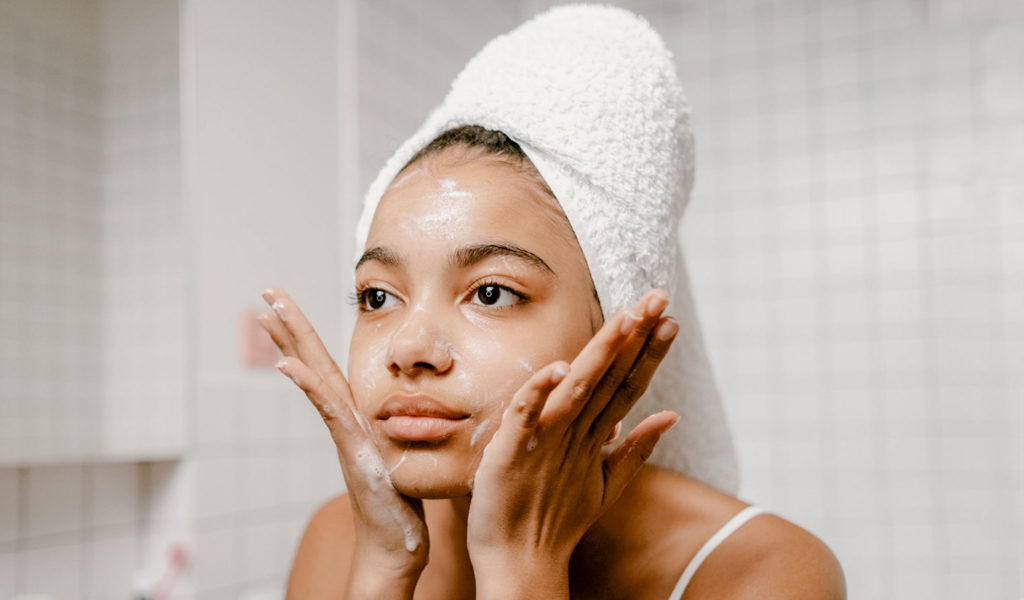People are increasingly aware of the packaging waste associated with food and drinks, but beauty products are also responsible for a huge amount of waste. In fact, the beauty industry now produces more than 120 billion units of packaging every year, which contributes to the loss of around 18 million acres of forest per year, as well as sending vast amounts of materials to landfill and causing increasingly concerning levels of marine pollution.
Despite this fact, people are still reticent to reduce waste in this area, with recent research finding that, while 81% of those surveyed look to reduce plastic packaging when shopping for fresh fruit and vegetables, only 18% did so for cosmetics. This is especially troubling given that beauty brands are part of a multi-billion dollar industry which is expected to continue growing over the next decade.
To compound the problem, cosmetics, from skincare products to deodorant, often come in “difficult to recycle” packaging that prioritizes branding over sustainability. There are two main reasons for this. First, many cosmetics use several materials for a single product. Take a pump on any cosmetics products for example, it often features several types of plastic and metal. This makes it near-impossible to recycle, both financially and in terms of energy expenditure during the process.
Second, cosmetics packaging is often very hard to clean, leaving leftover makeup within the packaging, reducing the value of that material. Additionally, the color of cosmetics packaging can also be problematic. Colored glass and colored plastic are not as valuable as “natural” or clear glass or plastic. Colored glass cannot be used to make new clear glass bottles and it’s too difficult and expensive to separate broken glass by color.
And finally, a major issue with recycling cosmetics is the size. Smaller packaging is often screened out and sent to trash rather than being recycled. Generally, any packaging smaller than your fist will not be recycled at a materials recovery facility (MRF).
The good news is there are certain beauty brands now attempting to change the landscape, designing low-waste or waste-free products that champion both sustainable packaging and/or natural ingredients to help increase recycling rates. Whether you’re searching for eco-friendly makeup or zero-waste hygiene supplies made from organic ingredients, here we review some of the best zero-waste beauty products available today.
LastSwab — Q-Tip Alternative
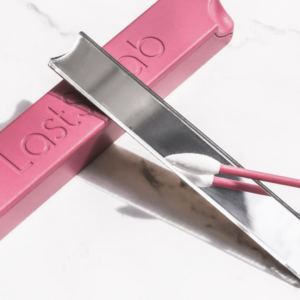
Source: lastobject
Cotton swabs have been a staple of cosmetics for almost a century. Unfortunately, the classic cotton-and-plastic design can wreak havoc on the environment. The sheer volume produced is staggering, with around 543.75 billion units made in 2017 alone, all of which eventually end up in landfills or flushed down toilets where they “escape through sewage and mix with water bodies” to become one of “the most pervasive forms of marine pollution”, according to the Cotton Buds World Industry Report 2018-2026.
LastSwab attempts to tackle this with a reusable swab made from thermoplastic elastomers (TPE), polypropylene (PP), and stored in a “bio-based carry case”. It is designed to replace up to 1,000 traditional swabs, with varying shapes, some of which are specifically designed as makeup removers as part of your existing beauty routine.
Bottle None — Be You Shampoo Bar
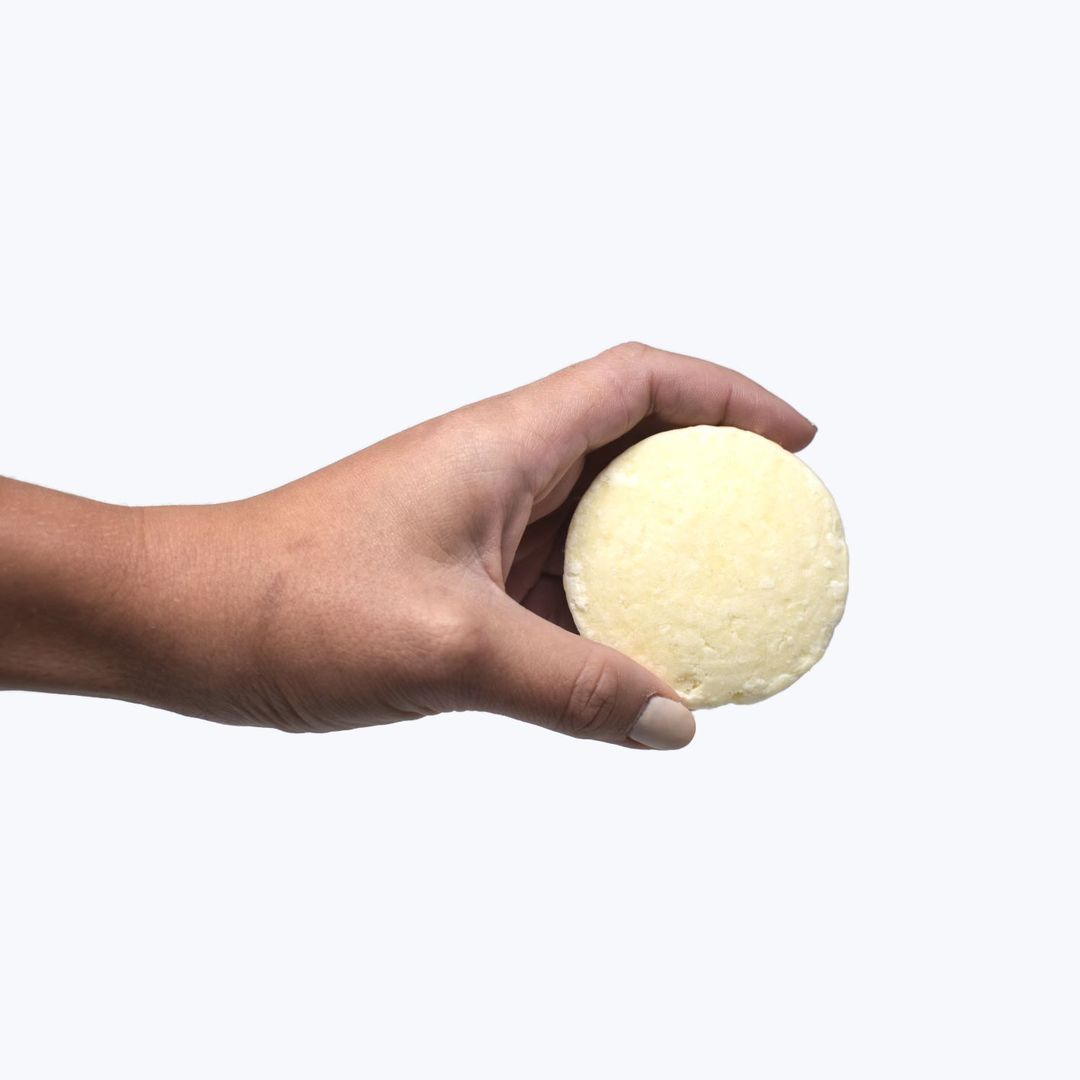
Source: zerowaste.com
In 2018, there was 39.9 million tons of plastic waste in the U.S. alone. This includes shampoo and conditioner bottles which are used for a short time and then discarded – many of them never making their way into recycling bins.
The Be You Shampoo Bar is one of a number of solid shampoo and conditioning products now on the market, which completely remove the need for any plastic packaging. However, it isn’t just the packaging that makes this product more eco-friendly. Solid-bar shampoos are also more highly concentrated than its bottled counterpart, meaning a reduction in transportation costs, as well as personal savings from not having to buy haircare products so frequently, making it one of the best zero-waste beauty products you can invest in.
Totally Taylored Makeup Wipes
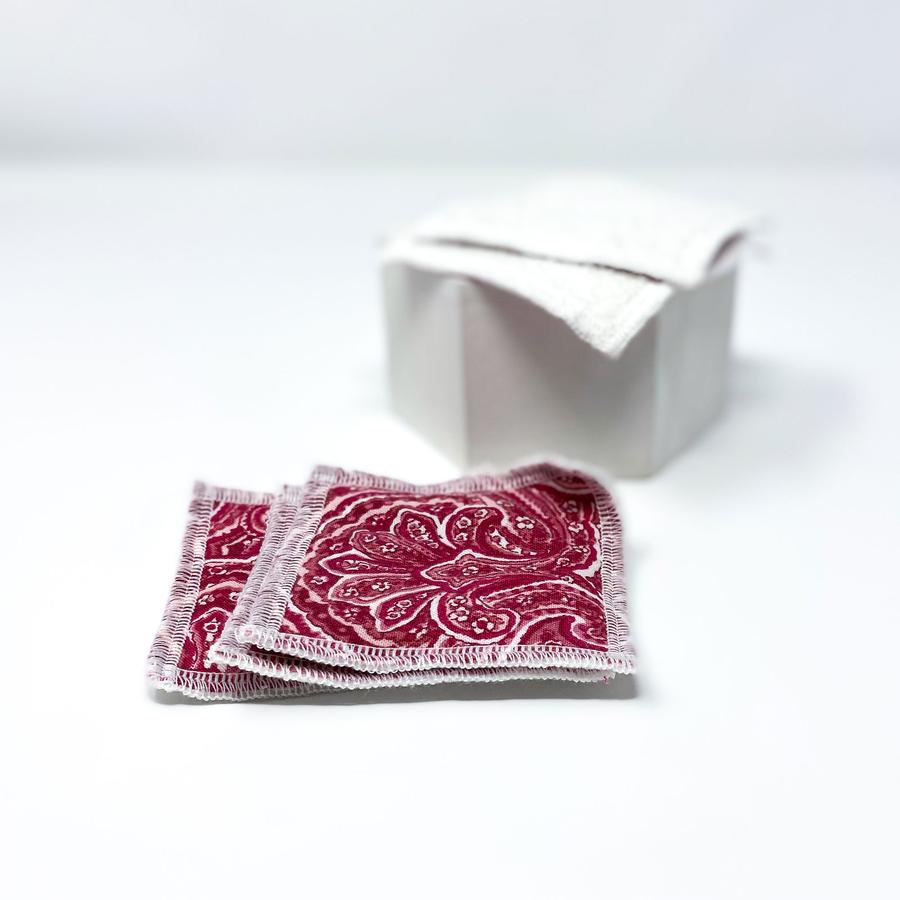
Source: zerowaste.com
Much like cotton swabs, cotton pads (also cotton balls or facial rounds) are used frequently, especially for removing makeup alongside a face cleanser. These are disposed of in landfills and down toilets after a single use. The issues are numerous, from the 20,000 liters of water it takes to make just a kilogram of cotton through the plastic sleeves that cotton pads are typically delivered in to the impact of transporting so many “disposable” products has on the local and global environment.
The alternative is reusable rounds, made from upcycled materials and designed to be used and washed over and over again rather than thrown away. Totally Taylored’s Reusable Makeup Wipes come in a set of 5. They are also handmade in Athens, Georgia to ensure good working conditions and reduced logistical impact for American consumers!
Eco Tools Makeup Brushes
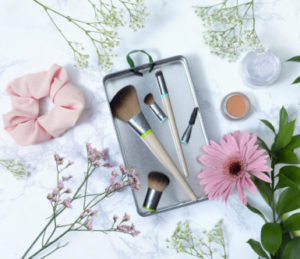
Source: ecotools
Plastic handles, plastic fibers, short-lives — “traditional” makeup brushes (or at least what we’ve grown used to in the past few decades) are a zero-waste nightmare.
Eco Tools is possibly one of the best zero-waste makeup brands when it comes to brushes, with a range of high-quality interchangeable heads for almost any application and a number of handles on which to put them. The kits also include a tin box for storage and increased longevity. There is some packaging, but it is completely biodegradable and even has a seeded sticker to bloom wildflowers from.
Prep Primer
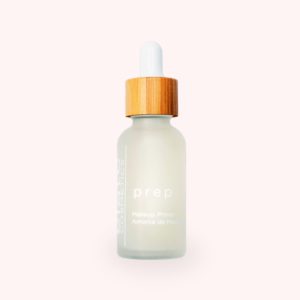
Source: zerowastestore.com
Where your skincare regime ends and makeup application begins exists face primer. And unfortunately, like many of the products that come either side of it, plastic containers are the norm. While these simpler tubs and tubes are often recyclable, the nature of the product can make cleaning very difficult, so they still run the risk of being sent to the landfill.
You can avoid this issue with the zero-waste Prep Primer, which is packaged in a glass bottle with a recyclable plastic and bamboo pump, with the strict instructions to “crush bamboo off of lid to compost. Thoroughly wash bottle and pump and add to your household recycling.” Or, better yet, try to reuse it! In addition to the packaging, Prep Primer is also 100% vegan and about 75% organic — as well as being one of very few zero-waste primer makeup options around.
Elate Creme Revealer Concealer
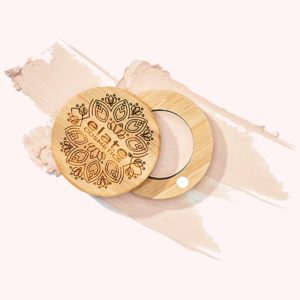
Source: zerowastestore.com
As with other zero-waste makeup products, the Elate Creme Revealer Concealer utilizes a reusable case (made of bamboo) with the option to order additional refills. What sets this one apart is the refills are wrapped in seed paper envelopes, meaning they are not only biodegradable but allow you to plant wildflowers when you get your order.
It’s also 100% vegan and around 75% organic — with Elate choosing Fair Trade ingredients over organic if a compromise is made. What’s more, there is a range of shades available, which can sometimes be a struggle to find with smaller brands zero-waste lifestyle brands.
Dab Herb Makeup Serum Foundation
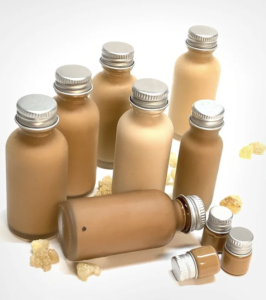
Source: dabhms
An option to take the place of both your primer and concealer lotion, this foundation has a completely transparent ingredients list that is vegan, cruelty-free, predominantly organic, and often food grade.
Importantly, it comes in glass and metal packaging, so there are no plastics to dispose of. What’s more, the company offers refills in the same (sanitized) containers if they are returned, meaning the same packaging should last you indefinitely. Dab Herb also uses their own suppliers’ packaging materials for orders they send to customers, as well as printing on recycled materials in their back office.
River Organics Vegan Blush Stick
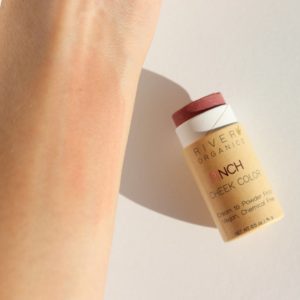
Source: riverorganics.org
Taking a different approach from other zero-waste cosmetics, this blusher from River Organics doesn’t come in a reusable container of metal or glass, but rather an eco-friendly paper tube, which can be composted since there are no harmful chemicals.
As the name would suggest, it’s also 100% vegan and cruelty-free, and the company is run by a husband and wife team based in the U.S.—so air miles shouldn’t be a problem. River Organics ships their blush in recycled envelopes from Eco-Enclose with sugar cane-based labels and no superfluous packaging or marketing materials.
Lush Cosmetics Naked Lipstick
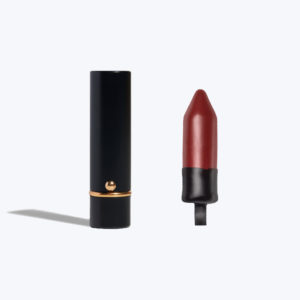
Source: lushusa
Twistable, plastic lipstick containers are made from several smaller parts—that equates to little chance it can be recycled. It’s no surprise, therefore, that an estimated one billion lipstick containers end up in landfill each year.
There are several companies now working on more eco-friendly options, but Lush has to make the list for their massive range of “naked” (aka plastic packaging free) products, as well as to note just how long they’ve been pushing the concept of zero waste beauty products.
Steering clear of cardboard tubes or finger-dipping tubs, Lush offers a refillable case and wax-wrapped lipstick. Not only this, but they also have transparent ingredient lists and maintain an adamant anti-animal testing stance. Additionally, if you’re working towards a zero-plastic self-care regime, you could even forgo the refillable container and use the lipstick straight from the wax!
Dirty Hippie Cosmetics Mascara
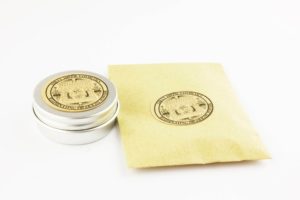
Source: etsy
Disposable plastic “wands” in disposable plastic tubes—like many types of cosmetics packaging, they are small enough to slip through regular recycling waste streams and make their way to landfill or the ocean.
Dirty Hippie Cosmetics is known to have some of the best zero-waste makeup on the market, and their mascaras and eyeliners are standout products with a 100% recyclable glass vial, secondary aluminum screw top, and no plastic reducer (unlike commercial mascaras). Additionally, the wand is a bamboo brush designed for washing and reuse, while each product is made to order so there’s no waste from excess batches—also allowing you to drop them a note if you already have a reusable brush.
This is an Australian brand, so those in Europe or the United States will have to weigh up the benefits of the product against the negatives of the miles. That said, they are lightweight and come in very little packaging, which according to the company is comprised of “recycled newspaper [they] collect as waste from local businesses and post-consumer recycled paper tape and boxes.” It’s also worth considering teaming up with some of your friends to buy in bulk if you are looking to get products shipped!
P.S—if you happen to have some old, plastic mascara wands, don’t throw them in the trash! Check out Wands for Wildlife instead for a reuse project that will melt the hardest of hearts.
These are a few of the most innovative zero-waste cosmetics out there, but it’s worth exploring what other products these brands offer since they often have a whole range of zero waste cosmetics you can mix and match.
Subscribe to zerowaste.com for more information on zero-waste living, or talk with one of our TRUE Advisors for more personalized insights on how you and your business can work towards zero waste.

